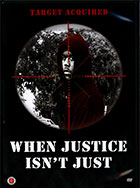
When Justice Isn’t Just 2016
Distributed by First Run Features, 630 Ninth Avenue, Suite 1213, New York, NY 10036; 212-243-0600
Produced by Dawn Kirk-Alexander and David Massey
DVD, color, 42 min.
High School - General Adult
Date Entered: 01/17/2017
Reviewed by LaRoi Lawton, Library & Learning Resources Department, Bronx Community College of the City University of New YorkWhen young, black teenaged men are shot and killed by white police officers and trigger extraordinarily intense social commentary about racial tension in communities like Ferguson, Missouri, it means we haven't solved the race equation yet. Until now, deaths like these were viewed as a chronic problem, endured by local communities yet largely hidden from broader public consciousness. With the rise of a new generation of digital activists and films like When Justice Isn’t Just, a sense of emergency in America has emerged in many communities across America. Fatalities at the hands of police are now front-page news and they can no longer be ignored.
The phrase “black lives matter” was born in July of 2013, in a Facebook post by Alicia Garza, called “a love letter to black people.” The post was intended as an affirmation for a community distraught over George Zimmerman’s acquittal in the shooting death of seventeen-year-old Trayvon Martin, in Sanford, Florida. The debate continues on this subject
When a mentally unbalanced, young, white man sits quietly in a historic, black church during a Bible study for an hour and then kills nine black parishioners in order to start a race war, it's more than just an isolated incident. When America's first Black president feels obligated to use part of his State of the Union address midway through his second term in office to talk about the state of the dialogue between blacks and whites in America, it means we haven't reached a point where we can genuinely talk about the issue of racial bias in the criminal justice system, in educational settings and in workplace hiring.
As a nation, we need a new, national conversation about race – about what it means when nearly every white person in America carries around an implicit racial bias that subconsciously prefers white people over black people in social, professional and educational settings. It's black and white. When Justice Isn’t Just’s, stark message is this: we need to start that dialogue now.